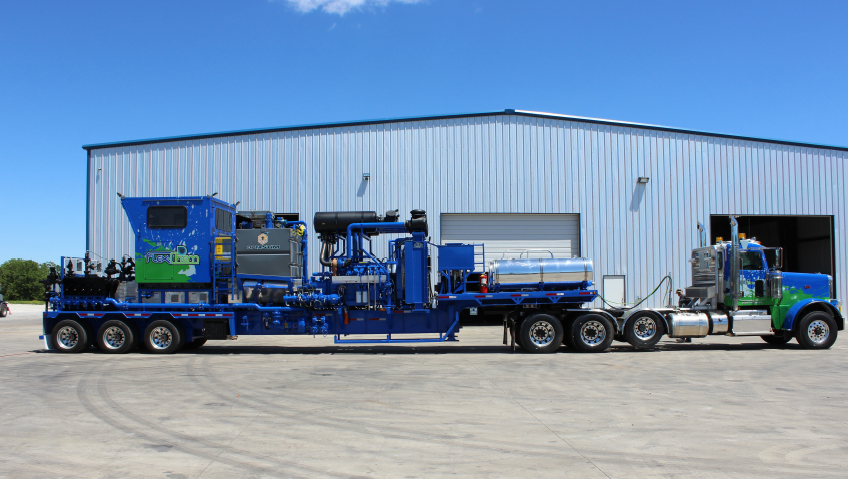Flex-Chem is a science-driven innovation leader for the oil and gas industry. The company launched in 2002 with a novel biotechnology used to control paraffin in oil wells, and the team has continued to develop new solutions by working closely with clients.
“We’ve since cultivated the culture of applying science to meet the technology needs of our growing industry,” says President Bryce Conway. “We engage with production companies and become a true extension of their own efforts.”
“As a technology focused company, we put a lot of effort into our laboratory testing and research and we try to rely on that to provide new solutions, new technologies that are not currently available in the market,” says Flex-Chem Senior Scientist, Scott Bailey, PhD. The company invests a considerable amount of revenue into research and development each year and boasts its own Technology Center, a state of the art facility where the team works to develop effective and economic solutions to clients’ needs.
The Center’s expert technical team has experience in a wide range of disciplines, including microbiology, biofilms, microbial induced corrosion (MIC), field inspections of corroding structures, water analysis, analytical and physical chemistry. These scientists are equipped to handle everything from flow assurance research to custom formulation, process development and the testing of oilfield biological/chemical products. In addition, the team works closely with the University of Oklahoma Department of Chemistry and Biochemistry and consults with Dr. Steven Foster, the university’s Mass Spectrometry Facility Director.
With offices in Weatherford, Oklahoma, Edmond, Oklahoma and Pecos, Texas, Flex-Chem is in the center of the action, and possesses several U.S. and international patents in frac water treatment and production enhancement fluids and additives. “Our location in the midcontinent area and Permian Basin has given us access to key markets and strategic insights into technology needs and opportunities of the industry,” Conway says. “Notably, Flex-Chem led the industry in identifying a type of damage caused to shale formations by completion fluids.” In response, the company developed its patented OptaSTIM® technology, which remediates the negative impact of introduced fluids on well performance. “OptaSTIM® has been successfully applied to the midcontinent area for the exponential production improvement of over 700 wells to date,” Conway says.
The team recognized the need for a solution in 2012, when they noticed that wells in the Woodford Shale were not living up to initial production promises. “They all had really high IPs [Initial Production],” Conway recalls. But within a year and a half, production plummeted. “Their production all seemed to be going on an exponential decline. We started looking at the properties of the shale and their interaction with the frac fluids and we discovered that there was a damage mechanism that was being created subterranean by the frac fluid.” The team developed OptaSTIM® to counter this skin damage, and the solution has been a runaway success. “Even after these wells are three years old and beyond we can get production above the original IP,” says Conway.
The team’s close relationship with clients helped them create OptaSTIM®. “Our operators brought a description of the problem to us,” Conway remembers. “They had been unsuccessful in finding a solution with other service providers. Working with them in our laboratory, we developed a kind of understanding of the symptoms of the problem and then we used our research to identify what… the problem was, what was causing the restriction in the flow of these wells. And once we were able to understand what was causing the damage, we were able to develop a technology to go and remove that damage and allow the wells to perform more with what the reservoir potential was.”
Flex-Chem is also a lead innovator in water treatment and conditioning for the oil and gas sector. Bailey says there has been an increased need for comprehensive water management strategies in recent years. “A lot of the water use practices really suffered from lack of stability of the water for reuse in completion operations,” he explains. “Flex-Chem developed a process to address some of these challenges. Using our background in biotechnology, we developed a process based on biological oxidation to treat the water, make it more stable for storage and reuse… Once it’s treated, we can prevent undesirable growth of harmful bacteria, we can meet higher quality reuse standards, and we can also provide what we feel is the lowest total water reuse cost in the industry.”
In 2009, Flex-Chem worked with Linn Energy to use this technology on the world’s first frac water recycling facility, located in Wheeler County, Texas. “It was successful,” Conway shares. The solution took off from there and today Flex-Chem’s water recycling technology is used by most of the water recycling facilities in the midcontinent area. “So far, we’ve used our process to treat more than 135 million barrels of water for reuse in the oil and gas industry,” says Bailey. “We believe that’s a significant achievement.”
By working closely with the industry, the team stays abreast of the market’s evolving needs. “Over the last year or so, we’ve noticed that a lot of the operators in the industry have really been doing some retooling and it’s been reflected in the guidance that they’ve given us,” Bailey says. “A lot of their field development plans have been dialed back in large part due to the market conditions.” In response, the team worked to create a solution to meet the logistical requirements of smaller operations. “We identified a need for water conditioning systems that are more flexible, easier to maintain and, of course, at the same time keep our price point down in the same area as we’ve been able to deliver with our large treatment systems,” Bailey says.
The team’s new solution is a portable, multipurpose water-conditioning unit. “It provides broad flexibility for water conditioning and treatment,” Bailey explains. The unit aerates the water to create conditions favorable for biological oxidation, “which is by and large the most cost-effective way to improve the quality and stability of water. It supports chemical amendments and mixing. It has water transfer capabilities and we can use it to provide water quality management throughout the water distribution system.”
Traditionally, mega water recycling facilities with a capacity of 1.5 million barrels or more utilized Flex-Chem’s water recycling technology. Now, with the company’s portable water-conditioning unit, the team can service much smaller operations. “These modular systems have a transportable design that is adaptable really to any pit or tank or water impoundment,” Bailey says. “It’s a very efficient, scalable system, so really it’s applicable to any type of water source.” The team sees a use for the system for everything from treated municipal water to industrial reuse water and well water.
Flex-Chem continues to roll out innovative solutions for the oil and gas industry. Currently, the company is in the process of launching OptaSTIM® E, a frac additive to prevent skin damage from forming. The new product could be utilized by “all the major shale plays across the United States,” says Conway, and the team has begun performing field trials with OptaSTIM® E with promising results.
Flex-Chem is eager to continue leading the market with innovative solutions. To make this happen, the team plans to maintain their close connection with clients. Both OptaSTIM® and the water treatment solutions “are examples of very strong, market demand technologies that were identified through close relationship with our customers,” Bailey says. With those two major accomplishments already under its belt – and strong industry connections firmly in place – Flex-Chem is ready to tackle the next challenge.













